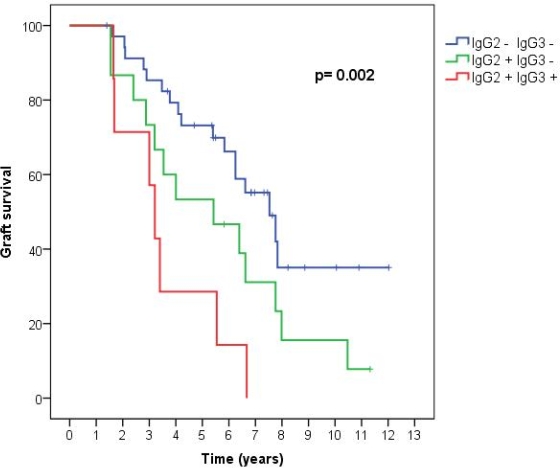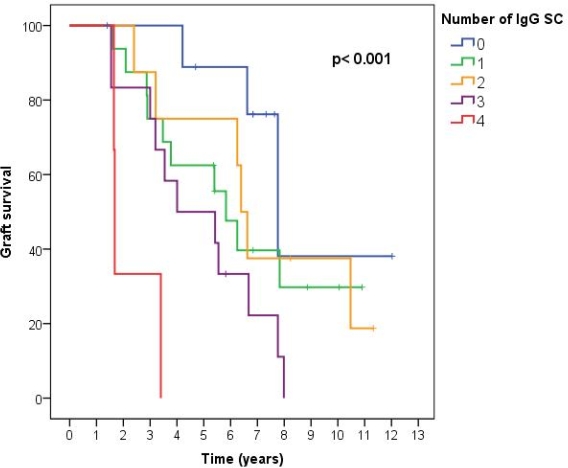Class II Anti-HLA IgG2 and IgG3 DSAs Predict Poorer Outcomes in Chronic Antibody Mediated Rejection of Renal Allografts
1Renal and Transplant Centre, Imperial College London NHS Trust, London, United Kingdom
2Histocompatibility and Immunogenetics, Imperial College London, London, United Kingdom.
Meeting: 2018 American Transplant Congress
Abstract number: 207
Keywords: Antibodies, Graft survival, IgG, Rejection
Session Information
Session Name: Concurrent Session: Kidney Chronic Antibody Mediated Rejection
Session Type: Concurrent Session
Date: Monday, June 4, 2018
Session Time: 2:30pm-4:00pm
 Presentation Time: 3:06pm-3:18pm
Presentation Time: 3:06pm-3:18pm
Location: Room 4B
Introduction: whilst the development of IgG3 and C1q binding de novo [dn] HLA DSAs are associated with a poor outcome in acute antibody mediated rejection, little is known about the role of IgG subclasses in chronic antibody mediated rejection [cAMR]. We describe the significance of dn HLA IgG DSAs and their subclasses in cAMR.
Methods: 1667 CDC/FCXM negative renal transplant recipients receiving a steroid sparing, tacrolimus based regimen with monoclonal antibody induction were studied. Sera from patients were screened for IgG DSA post-transplant at months 1, 3, 6, 12 and yearly or at times of allograft dysfunction. 90 patients with cAMR [Banff criteria] were studied. Patients with a positive IgG DSA went on to have IgG subclass testing.
Results: graft survival was significantly worse [p=0.015] in the 57/90 patients with DSA+ cAMR compared with the 33/90 DSA– cAMR patients. Graft survival in patients with DSA+ cAMR was significantly worse in the presence of a class II DSA (p=0.021) and the presence of class II IgG subclass 2 and/or 3 was particularly associated with significantly inferior graft survival (p=0.002). 
The cumulative total number of subclasses present worsened graft survival with a full house of IgG1-4 subclasses having the poorest graft survival (p<0.001). 
Discussion: We show that the presence of class II IgG DSAs in cAMR is particularly detrimental to graft survival and also highlights the significance of IgG2, IgG3 and cumulative subclasses in predicting poor outcomes.
Characterisation of IgG DSAs in cAMR may help to predict outcome and target patients for particular therapeutic strategies.
CITATION INFORMATION: Gueret-Wardle A., Lucisano G., Hassan S., Brookes P., Santos-Nunez E., Goodall D., Clarke C., Galliford J., Willicombe M., Taube D. Class II Anti-HLA IgG2 and IgG3 DSAs Predict Poorer Outcomes in Chronic Antibody Mediated Rejection of Renal Allografts Am J Transplant. 2017;17 (suppl 3).
To cite this abstract in AMA style:
Gueret-Wardle A, Lucisano G, Hassan S, Brookes P, Santos-Nunez E, Goodall D, Clarke C, Galliford J, Willicombe M, Taube D. Class II Anti-HLA IgG2 and IgG3 DSAs Predict Poorer Outcomes in Chronic Antibody Mediated Rejection of Renal Allografts [abstract]. https://atcmeetingabstracts.com/abstract/class-ii-anti-hla-igg2-and-igg3-dsas-predict-poorer-outcomes-in-chronic-antibody-mediated-rejection-of-renal-allografts/. Accessed February 20, 2026.« Back to 2018 American Transplant Congress
